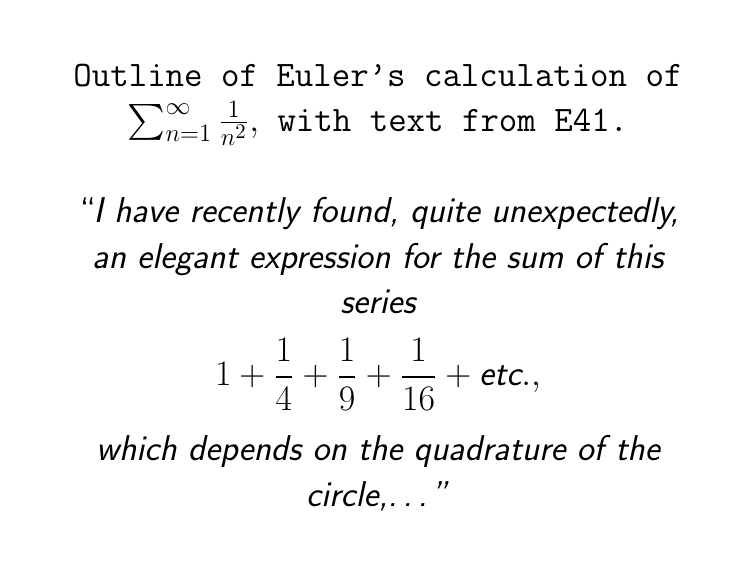- About MAA
- Membership
- MAA Publications
- Periodicals
- Blogs
- MAA Book Series
- MAA Press (an imprint of the AMS)
- MAA Notes
- MAA Reviews
- Mathematical Communication
- Information for Libraries
- Author Resources
- Advertise with MAA
- Meetings
- Competitions
- Programs
- Communities
- MAA Sections
- SIGMAA
- MAA Connect
- Students
- MAA Awards
- Awards Booklets
- Writing Awards
- Teaching Awards
- Service Awards
- Research Awards
- Lecture Awards
- Putnam Competition Individual and Team Winners
- D. E. Shaw Group AMC 8 Awards & Certificates
- Maryam Mirzakhani AMC 10 A Awards & Certificates
- Two Sigma AMC 10 B Awards & Certificates
- Jane Street AMC 12 A Awards & Certificates
- Akamai AMC 12 B Awards & Certificates
- High School Teachers
- News
You are here
Euler’s Calculation of the Sum of the Reciprocals of the Squares: A Mini-Primary Source Project for Calculus 2 Students
A central theme of most second-semester calculus courses is that of infinite series. Students typically learn to classify infinite series as convergent or divergent via a lengthy list of convergence tests. In some cases, they can proceed to evaluate a convergent series by strategically plugging an \(x\) value from the relevant interval of convergence into a power series formula. What is often missing is any indication that it is possible to evaluate an infinite series in any other manner!
Fortunately, in his 1740 paper De Summis Serierum Reciprocarum, Leonhard Euler (1707–1783) provided an example of a nontrivial evaluation of an infinite series that is beautiful and does not require significant extension of the topics one would normally cover in an introductory treatment of power series. Known as The Basel Problem, the evaluation of the series \[\sum_{n=1}^\infty \frac{1}{n^2}=1+\frac{1}{4}+\frac{1}{9}+\frac{1}{16}+\cdots\] proved to be quite a challenge. For example, Jacob Bernoulli (1655–1705) was able to prove the series converged to a number less than \(2\), but the exact value eluded him [Bernoulli 1713]. The mini-Primary Source Project (mini-PSP) Euler's Calculation of the Sum of the Reciprocals of the Squares guides students through Euler's incredibly clever proof that this series converges to \(\pi^2/6\).
Although issues related to series convergence were viewed differently in the 18th century, today's standard series convergence tests are used heavily throughout the project. No prerequisite knowledge is required to understand the proof itself beyond the power series for sine and basics from precalculus such as finding zeros of functions and factoring polynomials. While this project is intended for an introductory calculus course, it also makes an ideal starting point for a discussion of the Riemann zeta function or the Weierstrass Factorization Theorem in a complex analysis course, or a discussion of generating functions in a combinatorics course.
 |
The complete project Euler's Calculation of the Sum of the Reciprocals of the Squares (pdf) is ready for student use, and the LaTeX source code is available from the author by request. A set of instructor notes that explain the purpose of the project and guide the instructor through the goals of each of the individual sections is appended at the end of the student project.
This project is the eleventh in A Series of Mini-projects from TRIUMPHS: TRansforming Instruction in Undergraduate Mathematics via Primary Historical Sources appearing in Convergence, for use in courses ranging from first year calculus to analysis, number theory to topology, and more. Links to other mini-PSPs in the series appear below, including two additional mini-PSPs for first-year calculus. The full TRIUMPHS collection also offers six other mini-PSPs and one more extensive full-length PSP for use with students of calculus.
Acknowledgments
The development of the student project Euler's Calculation of the Sum of the Reciprocals of the Squares has been partially supported by the TRansforming Instruction in Undergraduate Mathematics via Primary Historical Sources (TRIUMPHS) project with funding from the National Science Foundation’s Improving Undergraduate STEM Education Program under Grants No. 1523494, 1523561, 1523747, 1523753, 1523898, 1524065, and 1524098. Any opinions, findings, and conclusions or recommendations expressed in this project are those of the author and do not necessarily reflect the views of the National Science Foundation.
References
Bernoulli, Johanne. 1713. Ars conjectandi, opus posthumum: accedit Tractatus de seriebus infinitis, et epistola Gallice scripta de ludo pil reticularis. Basile: Impensis Thurnisiorum.
Euler, Leonhard. 1740. De summis serierum reciprocarum. Commentarii academiae scientiarum Petropolitanae 7:123–134.
Kenneth M Monks (Front Range Community College–Boulder County Campus), "Euler’s Calculation of the Sum of the Reciprocals of the Squares: A Mini-Primary Source Project for Calculus 2 Students," Convergence (August 2019), DOI:10.4169/convergence20190801




